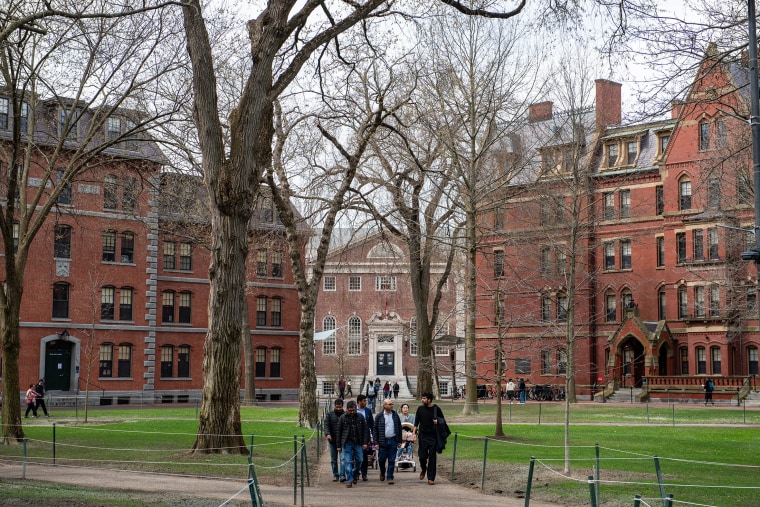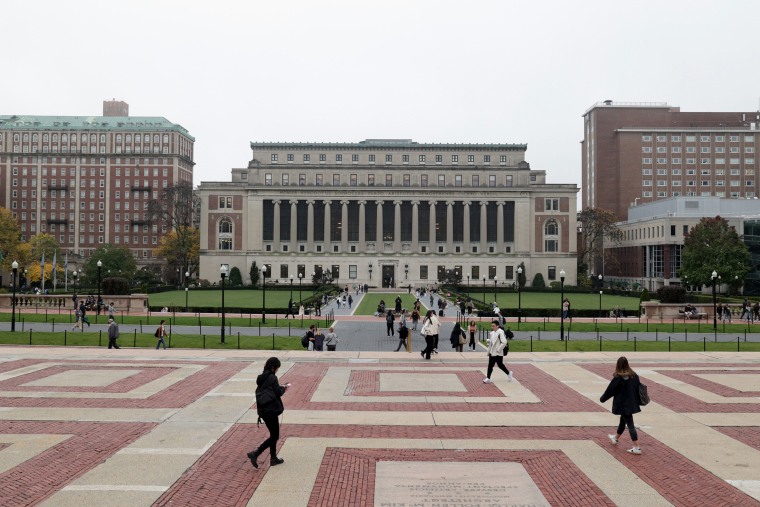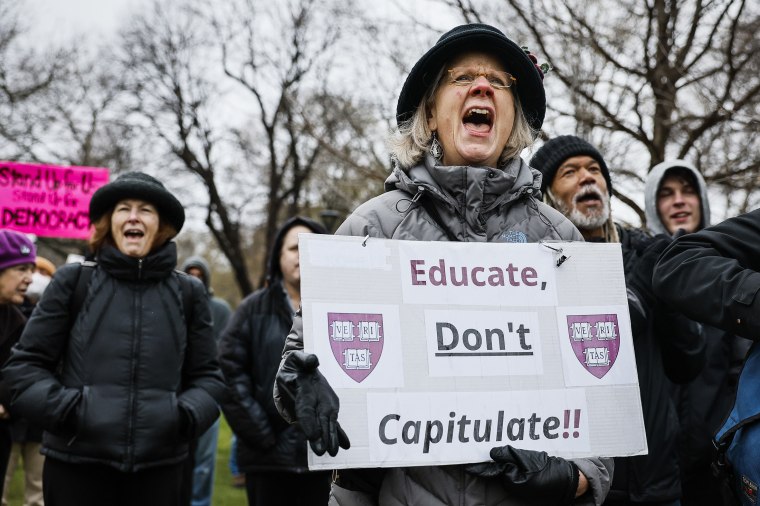LOS ANGELES — In recent weeks, President Donald Trump’s administration has pointed to the fight against antisemitism as one reason it is threatening to pull hundreds of millions in funding from Ivy League universities and attempting to deport international student activists who protested against Israel’s war in Gaza.
In some instances, Jewish organizations have cheered what they view as Trump’s crackdown on the antisemitism that has swelled since the Oct. 7, 2023, terror attacks on Israel and the subsequent invasion of Gaza. But in many other cases, leading Jewish groups and advocates have expressed deep discomfort with what the government professes to do in the name of Jewish safety.
The divide echoes some of the internal political divisions among Jewish Americans over the last 18 months.
Rabbi Sharon Brous, the founding and senior rabbi of IKAR, a Jewish community based in Los Angeles, succinctly captured that unease with a sermon she delivered to her nondenominational congregation on March 8. It was titled, “I Am Not Your Pawn.”
“What may feel, today, like a welcomed embrace is actually putting us at even greater danger,” Brous said, according to a copy of her sermon published on IKAR’s website. “We, the Jews, are being used to advance a political agenda that will cause grave harm to the social fabric, and to the institutions that are best suited to protect Jews and all minorities.”
“We are being used. Our pain, our trauma, is being exploited to eviscerate the dream of a multiracial democracy, while advancing the goal of a white Christian nation,” Brous added.
Brous is not alone in voicing displeasure with the Trump administration’s tactics and strategy. In a joint statement Tuesday, a coalition of 10 organizations representing a wide swath of American Jewry flatly rejected what they characterized as “the false choice between confronting antisemitism and upholding democracy.”

The organizations — assembled by the Jewish Council for Public Affairs, a pro-democracy group — made clear they believe that antisemitism has become more “visible, chilling, and increasingly normalized,” and “requires urgent and consistent action.” But they forcefully criticized the Trump administration’s sweeping crackdown on universities and pro-Palestinian protesters.
“In recent weeks, escalating federal actions have used the guise of fighting antisemitism to justify stripping students of due process rights when they face arrest and/or deportation, as well as to threaten billions in academic research and education funding,” the 10 organizations said. “Students have been arrested at home and on the street with no transparency as to why they are being held or deported, and in certain cases with the implication that they are being punished for their constitutionally-protected speech.”
“Universities have an obligation to protect Jewish students, and the federal government has an important role to play in that effort; however, sweeping draconian funding cuts will weaken the free academic inquiry that strengthens democracy and society, rather than productively counter antisemitism on campus,” the groups added. “These actions do not make Jews — or any community — safer. Rather, they only make us less safe.”
The groups behind the message included the National Council of Jewish Women, the Central Conference of American Rabbis and the Union for Reform Judaism.
The statement was released a day after the government said it would freeze more than $2 billion in grants to Harvard University after the school said it would not accept demands from the administration’s Joint Task Force to Combat Anti-Semitism. The demands included limiting the acceptance of international students who are “hostile to the American values and institutions.”

Columbia University signaled last month it would comply with the administration’s demand in exchange for restoring some $400 million in federal funding. The administration has also paused university funding for grants and contracts at Brown, Cornell, Northwestern, Princeton and the University of Pennsylvania.
Sen. Chuck Schumer, D-N.Y., the most prominent Jewish elected official in the country and the author of a recent book about antisemitism, blasted the White House for “making unprecedented demands of universities aimed at undermining or even destroying these vital institutions.”
Schumer, who is a Harvard graduate, said Monday that institutions of higher learning “must do more to fight antisemitism on campus,” but applauded the nation’s best-known Ivy League school for bucking Trump’s demands: “Harvard is right to resist.”
The American Jewish Committee, an influential advocacy group, recently reiterated calls for universities to “take action to counter and prevent antisemitism on their campuses.” But the organization took issue with what it called “the broad, sweeping, and devastating cuts in federal funding that a growing number of American research universities have been subjected to in recent weeks.”
The organization added that the administration’s cuts, initiated “under the auspices of combating antisemitism, will damage America’s standing as a center of innovation and research excellence.”

But crucially, some Jewish organizations have vocally supported Trump’s second-term agenda, while others have refrained from harshly criticizing the president.
Nathan Diament, the executive director of public policy for the Orthodox Union, the nation’s largest Orthodox Jewish umbrella organization, said in an interview Tuesday that his constituents were pleased that the White House appears to be taking antisemitism seriously.
“I would say, overall, without getting into each individual instance, certainly the segment of the American Jewish community that we represent appreciates that President Trump and his team are being much more aggressive in fighting the surge of antisemitism that we’ve seen for more than a year and a half,” Diament said.
He said his organization had repeatedly lobbied the Biden administration to take a tougher line on antisemitism, adding that while he recognized that the previous White House “took some steps,” he was glad to see Trump’s more bellicose approach.
Matt Brooks, the chief executive of the Republican Jewish Coalition, said his organization “enthusiastically applauds the Trump administration for taking bold, decisive action to combat anti-Americanism and antisemitism in higher education after years of weakness and appeasement of the campus mobs by the Biden-Harris administration.”
“There’s a new sheriff in town, and his name is Donald J. Trump,” Brooks added.
The Anti-Defamation League, one of the nation’s foremost Jewish advocacy groups, drew criticism after it backed the March 8 arrest of Mahmoud Khalil, a Palestinian graduate student who played a prominent role in the sprawling protests last year against Israel at Columbia University.
“We appreciate the Trump Administration’s broad, bold set of efforts to counter campus antisemitism — and this action further illustrates that resolve by holding alleged perpetrators responsible for their actions,” the ADL wrote in part in a March 9 post on X.
“Obviously, any deportation action or revocation of a Green Card or visa must be undertaken in alignment with required due process protections,” the ADL added. “We also hope that this action serves as a deterrent to others who might consider breaking the law on college campuses or anywhere.”
Khalil is a 30-year-old legal permanent resident from Syria. In a ruling last week, a federal judge said the Trump administration can deport him. The administration has cited Khalil’s beliefs in justifying his deportation. In one memo, Secretary of State Marco Rubio wrote that allowing Khalil to stay in the U.S. would create a “hostile environment for Jewish students.”
In the midst of the Trump administration’s flurry of activity, some Jewish voices have expressed a certain ambivalence about the White House’s confrontation with universities.
The publisher and editor-in-chief of The Jewish Journal, a publication based in Los Angeles that prints editorials from a conservative viewpoint, recently wrote he was “torn between two sentiments.”
“On the one hand, it’s good to see that our government is taking seriously the anti-Jewish onslaught that began on college campuses right after the Hamas massacre of Oct. 7,” David Suissa wrote in an editorial published April 2.
“But if the government goes too far and uses ‘antisemitism’ as an excuse to unlawfully kick out agitators, the effort will end up backfiring on the Jews. The last thing we need is to be held responsible for the overreach of an overly aggressive government.”